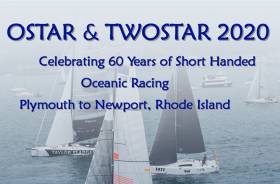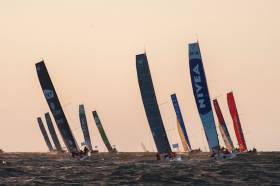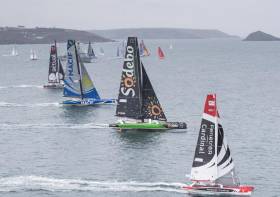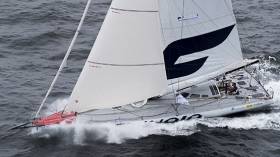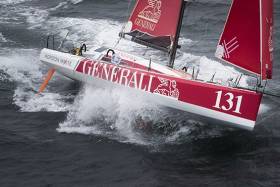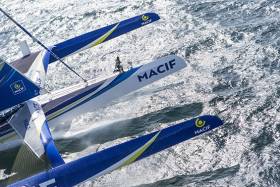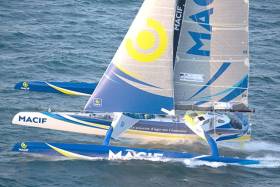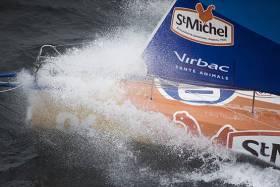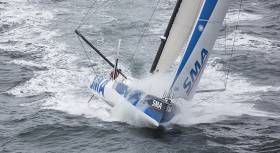Displaying items by tag: Transat
Start of McIntyre Adventure Globe 5.80 Transat Delayed For 24 hours To Welcome Irish Entrant
The McIntyre Globe 5.80 design was created by Australian voyager and adventurer Don McIntyre to bring Mini Transat-style campaigning within the reach of independent sailors with minimal resources. Photographer Jim Schofield (57) of Blessington in County Wicklow - a member of Poolbeg Y&BC in Dublin - was one of those attracted to the idea, and he built his own Globe 5.80 (it’s just 19ft long) in a shed at his home with the November 2021 Globe 5.80 Transat in mind.
Despite all the difficulties posed by COVID lockdowns, he has the boat completed, but getting it to the start line in Lagos in Portugal in time for the start scheduled for tomorrow (Sunday, October 31st) was best done by road trailing. Even that has seen the count-down time being severely reduced, but as the other entrants know only too well of the challenges involved, they have postponed their start until Monday 1st November in order to welcome the Blessington skipper into the fleet, even if he does not anticipate starting unit Thursday (November 4th).
The official statement confirmed the changes:
The Race Director of the G580T Lutz Kohne, has delayed the start of the McIntyre Adventure Globe 5.80 Transat 24hrs to Monday 1st NOV. at 1200 hrs UTC. While the weather was acceptable for Sunday 31st, the entrants all agreed it would be best to await the arrival of Irish entrant JIM SCHOFIELD, who has been towing his yacht ‘Molly Claire” from Ireland by car and is not due to arrive in Marina de Lagos until Sunday night. He will then launch, rig and prepare to sail in the following days. Jim has made a huge effort to be with the fleet and join the race and is now not expected to start until Thursday, catching up with the fleet officially in Marina Rubicon in Lanzarote.
All entrants want to have a drink with him before they set off! That is how the Globe 5.80 family works.
“Our fleet is the same size as the VOLVO Race fleet, so that is cool and the entrants are one big family and this is all for them!” Said Don McIntyre, founder of the 5.80 class and skipper of TREKKA.
Follow the live Tracker on www.Globe580Transat.com and live coverage of the start on Globe 5.80 Transat Facebook Page.
 The Globe 580 concept and design was created by Australian Don McIntyre
The Globe 580 concept and design was created by Australian Don McIntyre
OSTAR & TWOSTAR To Remain In Plymouth, RWYC Confirms
Plymouth’s Royal Western Yacht Club has confirmed that it will run its OSTAR and TWOSTAR transatlantic races in 2020 from Britain’s Ocean City as it has done every four years since the first race in 1960.
“These races from Plymouth to Newport, Rhode Island will continue to be sailed as originally envisaged by Cockleshell hero Blondie Hasler, a test of skipper and boat against the North Atlantic Ocean,” said the club, which will next year celebrate 60 years since it introduced short-handed oceanic racing.
The OSTAR and TWOSTAR events will also be supported by Plymouth City Council as part of next year’s Mayflower 400 celebrations.
“Unfortunately the French organisers of The Transat 2020 have now decided to start their race in Brest rather than Plymouth,” the Plymouth club added. “This deprives the skippers and public of the opportunity to meet and share in the 60th anniversary of the OSTAR.”
The RWYC explained that The Transat was first sailed in 2004 when it decided it could no longer afford the cost or responsibility of running a ‘Grand Prix’ type event for the larger, one-design, highly sponsored and professionally skippered boats.
“The RWYC selected a commercial events organisation to run this part of the race while they continued to run the OSTAR, for professional and experienced skippers alike sailing any class of boat, as the corinthian event envisaged by the original participants 60 years ago.”
Plymouth No Longer Host Of Transat 2020 Start As Race Moves Across The Channel To Brest
The next edition of The Transat will now start in the French port city of Brest instead of Plymouth, race organisers have announced.
Plymouth on the Devon coast was originally confirmed over a year ago as the start venue for the 2020 edition of the four-yearly event, the first and oldest single-handed transatlantic race in history.
No explanation has been given for the switch away from Britain’s Ocean City, other than race owners and organisers OC Sport Pen Duick saying that the change comes as it looks “for innovative ways to secure the future of The Transat”.
“We are really pleased to be partnering with Brest for The Transat, and together we share a strong desire to continue developing the race in 2020 and beyond,” OC Sport CEO Hervé Favre said.
“We have seen from races such as the Route du Rhum-Destination Guadeloupe [also owned by OC Sport Pen Duick] just how engaged the French public are with offshore sailing where we had over two million visitors to the race village.
“Staging the start from Brest is a real opportunity for our sponsors and the teams to capitalise on this captive audience and we expect it to open up many new commercial opportunities which are essential to guarantee the longevity of the race. I’d like to thank Plymouth for their support of the race up until this point.”
The Transat will celebrate its 60th anniversary when the world’s top solo sailors gather to race 3,500 nautical miles across the North Atlantic this time next year.
While the race was born in the UK, its organisers say it has always attracted the French elite of offshore sailing, who in recent years have dominated the race.
Last year Plymouth was also the focus of rumours that it might lose out as the traditional start of the Rolex Fastnet Race to a French port, though that speculation was swiftly shot down by the RORC which said it was working to make the Plymouth start even “bigger and better”.
Transat 2020 Confirms Plymouth as Start Venue
Britain's Ocean City, Plymouth, has won the bid to host the start of the next edition of The Transat in 2020, the first and oldest single-handed transatlantic race in history.
The iconic and historic port on the Devon coast, which has a rich history of staging prestigious professional sailing events, will host The Transat for the second time in succession, having welcomed the race at the start of the last edition in 2016.
Race owner and organiser OC Sport has confirmed a start date of the 10th May 2020 for The Transat. The race is the successor, for professional sailors, to the original solo race across the North Atlantic that was born as the OSTAR in 1960 and which featured legends like Blondie Hasler and Sir Francis Chichester.
Hervé Favre, Offshore Sailing Event Director at OC Sport, commented: "The Plymouth City Council bid was extremely strong and we are delighted to be starting the 15th edition of this iconic race from its historic home.
"In the last edition in 2016, Plymouth provided the ideal launching platform for the race. The world-class boats were right in the heart of the city, we received fantastic support from local businesses while attracting thousands of people to the free-to-enter public race village."
The 3,500-mile quadrennial race across the North Atlantic has a fearsome reputation and is regarded as one of the toughest professional solo ocean races. It is a challenge dominated by the progression of low pressure systems sweeping across the North Atlantic that produce the headwinds that define this classic race.
In 2016, Frenchman Armel Le Cleac'h took an impressive win in the IMOCA 60 class aboard Banque Populaire, in a time of 12 days, 2 hours, 28 minutes and 39 seconds. For Le Cleac'h, The Transat proved to be the ideal training ground for the non-stop round-the-world race, the Vendée Globe, which he went on to win later that year. "The Transat is difficult because it is the only race that crosses the North Atlantic in this way. So we are against the prevailing winds which makes the course demanding and difficult," he commented.
"It holds very good memories for me. In 2008, arriving second in the IMOCA was good and in 2016 it was my first solo victory in the IMOCA class. So it is important to me, it's a legendary race and a great race."
Commenting on Plymouth as a start city, Le Cleac'h continued: "The start from Plymouth was exceptional in 2016. The locals and visitors welcomed us warmly and we loved that they do so with great pleasure. There is a passion for boats there, the sea and everything marine related.
"The week in Plymouth is a great celebration and it motivates us for the race, all of us are driven by the enthusiasm of the locals. It is an ideal place for the start of this legendary Transatlantic race."
Councillor Glenn Jordan, Cabinet Member for Culture at Plymouth City Council, said: "Plymouth City Council is delighted to be working with OC Sport to host the start of the 15th Transat race in 2020. As Britain's Ocean City, Plymouth has a rich maritime history and is deeply connected with the sea. We are proud to have been the starting point for this race every year since its inception in 1960; it epitomises the spirit of adventure our city is famous for."
Charles Hackett, Chief Executive of Mayflower 400, said: "Plymouth is at the heart of the upcoming 400th global anniversary commemorations of the Mayflower journey in 2020, so it is fitting that we welcome the return of The Transat race, an endeavour of sailing the Atlantic which links the UK and the US, in the same year."
Racing classes invited to take part in The Transat 2020 edition include the breathtaking Ultime multihulls measuring anything from 51-feet and above, Class40 monohulls (40ft) and Multi50 multihulls (50ft). They will line up on the start in Plymouth Sound alongside the ocean's monohull thoroughbreds – the IMOCA 60s (60ft), the world's leading solo class as part of their official race calendar, that will go on to contest the Vendée Globe later that year.
Skippers competing in The Transat will also be guaranteed a place on the startline of the Route du Rhum – Destination Guadeloupe in 2022. The single-handed transatlantic race, which is also owned and organised by OC Sport, has an entry limit of 120 boats, and due to the huge demand, a full startline is expected.
The start in Plymouth will be preceded by an official Prologue from Brittany, giving sponsors, media and VIP guests the opportunity to join the solo sailors as they race across the English Channel to the start line.
The host city for the finish of the race and the prologue location will be confirmed at a later date.
British sailor Richard Tolkien, one of the competitors in The Transat bakerly transatlantic race from Plymouth to New York, abandoned his yacht and boarded the Cargo Ship ANTON TOPIC at 21:40 GMT today, (13 May).
At 19:45, Race Control received a 'demand for assistance' from Richard Tolkien, the skipper of the IMOCA 60, 44, at a position approximately 880 nautical miles west, southwest of Horta in the Azores.
Tolkien reported that he had been struggling with some major technical issues on his boat, including damage to the inner forestay. While he was on the foredeck trying to clear the sail, which was entangled in the rig, Tolkien was hit by one of the sails, sustaining an injury to his head.
After assessment by satellite phone with his shore crew, and with the Race Director and Race Doctor, and on liaising with the MRCC (Maritime Rescue Coordination Centre), a VHF call was made to the cargo ship ANTON TOPIC, which was in the vicinity of Tolkien’s position. The decision was taken to abandon ship, on account of Tolkien’s injury and the daylight fading.
At 21:40 GMT, after an expert approach, the crew of the ANTON TOPIC were able to execute the safe transfer of Tolkien from his yacht to the ship. The ANTON TOPIC is heading to Philadelphia (USA), with an estimated time of arrival of the 18 May.
Tolkien relives his mid-Atlantic rescue - update at 1600 Sat
The British sailor Richard Tolkien today spoke about his dramatic rescue in the mid-Atlantic when he was picked up by a cargo ship after deciding to abandon his IMOCA 60, 44, in The Transat bakerly.
Tolkien, 61, from Lymington in Hampshire on the English south coast, was picked up by the cargo ship Anton Topic at a position about 880 nautical miles west of Horta in the Azores.
He had been sailing in last place in the IMOCA fleet in an old Finot-design from 1998 that was originally called Sodebo and sailed by Frenchman Thomas Coville. Tolkien took the difficult decision to abandon the boat - now called 44 after the UK dialing code - on Friday night and then made a perilous, but successful, transfer to the ship.
“I had had a sustained period of bad weather…and the wind had started to go down from 40 knots to 30,” he said on the satellite phone from the bridge of the Anton Topic this morning as it made its way towards Philadelphia. “I thought there was no trouble ahead and I was down below, looking forward to calmer conditions, when there was a large bang.
“The fitting holding the staysail stay to the deck had ruptured. By the time I got on deck the sail was flailing around. I turned the boat downwind and spent the next two hours trying to sort out the mess – it is very difficult on a boat of that size.
“I was hit in the face and then later again by a glancing blow to the side of the face by the furling drum at the bottom of the stay. On the second occasion there was a lot of blood on the deck and I went down into the cabin and realised I needed to call for assistance.
“I used the AIS (Automatic Identification System) to call up the nearest ship and the Anton Topic and its captain and crew were not too far away and came towards me and manoeuvred their ship alongside me. It was not easy at all and then I had to climb up the pilot ladder at the side of the ship and I only just made it, so it was very difficult.
“I had to leave the boat which has a tracker on it – not an easy situation - and I hope to rescue the boat. It was just a glancing blow – but if it had been a bit more full-on, then the outcome could have been very different,” Tolkien concluded.
When he got on board the Anton Topic he was treated by the ship’s medic who applied four stitches to his head wound. After a few hours sleep on board, Tolkien said he was happy that all his faculties were intact. “Apart from being tired and bit shocked, I’m OK," he said.
Tolkien set sail from Plymouth bound for New York with 24 other solo skippers on The Transat bakerly on May 2nd. A former civil servant and corporate financier, Tolkien is an experienced amateur ocean racer. He completed this race in 1992, finishing 6th in the monohull division after 17 days. In 2000 he entered the Vendée Globe solo round-the-world race but had to retire halfway down the Atlantic with sail damage. In 2010 he finished 33rd in the Route du Rhum Destination Guadeloupe.
At the start of this race Tolkien said his aim was not to beat the other boats in his class but to qualify for the Vendée and learn about his boat.
Joschke Suffers Damage to Her Boat in Transat
The Franco-German sailor Isabelle Joschke is currently assessing her options with her shore team after she discovered structural damage to the bow area of her Class40 yacht, Generali-Horizon Mixité, in the north-Atlantic.
Joschke, aged 39, had been leading the very close battle at the head of the Class40 fleet at a position about 630-nautical miles east, southeast of Nova Scotia but is now deciding where to head to, to make repairs.
The boat was sailing on starboard tack in 30 knots of wind when Joschke heard strange noises coming from the portside bow area, forward of the main bulkhead.
On inspection, she discovered water coming into the sail locker and quickly rolled her staysail and turned the boat downwind, 180 degrees away from the race heading.
It seems the failure is a crack in the hull which means there is no chance that she can continue upwind to New York, still over 1,000 miles away. This is a bitter disappointment for Joschke who was sailing a remarkable race in her first outing on a Class 40.
“We are currently developing a strategy for Isabelle who is looking for more favorable weather conditions to minimise the water ingress and settle on a route to a destination that will save her boat - Isabelle is well," summarised Joschke’s team leader Alain Gautier.
The main options for her are to try to head for Nova Scotia or perhaps head south, southeast towards the Azores which are about 1,000 miles away.
Joschke is the third Class40 skipper to sustain damage during the race after Maxime Sorel whose boat hit a containership and Armel Tripon who stopped in the Azores after the storm.
Among the seven remaining entries Edouard Golbery on Region Normandie in sixth place had to run off downwind while he worked to repair damage to his mainsail but he has now resumed his course to New York.
The class is now being led by Thibaut Vauchel-Camus on Solidaires en Peloton-Arsep who is just four miles ahead of Britain’s Phil Sharp on Imerys.
The next boat to reach the finish line off Sandy Hook is expected to be the longtime IMOCA 60 leader Banque Populaire, skippered by Armel Le Cléac’h. He currently has 220 miles to sail and is expected early tomorrow afternoon UK time.
Gabart Takes Line Honours in The Transat Bakerly 2016
Frenchman François Gabart on board his new 100ft trimaran Macif, crossed The Transat bakerly finish line at 18:24 EDT (22:24 GMT) this evening off New York, taking line honours in the Ultime class.
The finish time, recorded by the Sandy Hook Pilot Association boat, marks the first solo race win on Macif for the 33-year-old, who in 2013 became the youngest ever winner of the Vendée Globe solo round-the-world race. Gabart covered the official course distance of 3,050 nautical miles in 8 days, 8 hours, 54 minutes and 39 seconds.
Gabart actually sailed a total distance of 4,634 miles at an average speed of 23.11 knots in a remarkable voyage. Unusually for The Transat bakerly, it took him, and his close rival Thomas Coville on Sodebo, hundreds of miles south of the Azores into the tradewinds before sling-shotting northwest up to New York.
As Gabart crossed the line Coville was still some 118nm from the finish while the third-placed trimaran in the Ultime class – Actual skippered by Yves Le Blevec – was still 509.6nm away.
Macif on Track for Transat Race Record Smash
The Transat bakerly from Plymouth to New York is in its final stages for Macif skipper François Gabart who is now just over 450nm away from the finish line. The current routing is showing Gabart’s estimated time of arrival as tomorrow at 1300 EDT (1800 BST).
Now well into his seventh day of racing, Gabart is 126 miles away from his closest rival Thomas Coville aboard Sodebo, and 473 miles ahead of the third Ultime Actual, skippered by Yves Le Blevec.
Gliding towards the Big Apple at around 20 knots, the 33-year-old skipper looks set to break The Transat bakerly race record tomorrow. Gabart’s mentor and friend, Michel Desjoyeaux, currently holds the record after sailing the ORMA trimaran Géant from Plymouth to Boston in 2004, in a time of eight hours, eight days and 29 minutes.
Although sailing towards a different finish line, this year’s edition of The Transat bakerly to New York is in fact longer than the record-setting course to Boston. If Gabart can finish before 1730pm local time tomorrow, the record is his.
However, although closing on a first solo win in his magnificent new racing machine, there are still 450nm to go. Speaking briefly via sat phone this morning, Gabart was keen not to tempt fate, well aware that a small mistake or a breakage could yet be his undoing. He was also not underestimating Coville, saying he expects a furious fight to the finish.
For the other classes in the fleet, the New York City skyline is over 1,000 miles away. This morning, Armel Le Cléac’h (Banque Populaire) continues to lead the IMOCA 60 fleet by 42 miles, with Vincent Riou on PRB still hot on his stern.
After a week of racing at breakneck speed, followed by a rough and uncomfortable weekend, Le Cléac’h is enjoying a little respite in lighter airs this morning.
“The conditions are much calmer,” he reported. “I’m taking advantage of not having the boat so heeled over. I can stand up normally to eat and I’ve been able to dry out a little.
“It’s been damp on board since the start and we’ve not had much time to rest and regroup. The race is still very much in full force and I’m always watching my friends behind. Vincent (Riou) is always close and, in the lighter wind conditions, I do not feel comfortable. Adding to that pressure is Jean–Pierre (Dick on St Michel-Virbac in third place). The race to the finish is set. We’re only lacking Jojo!" (Sébastien Josse on Edmond de Rothschild who retired early in the race with broken mainsail battens).
In the four-boat Multi50 class, Gilles Lamiré (French Tech Rennes St Malo) still leads the fight with an advantage of 193 miles between him and the chasing Lalou Roucayrol (Arkema).
Thibaut Vauchel-Camus (Solidaires en Peloton–Arsep) continues to lead the nine-boat Class40 fleet, locked in battle with Isabelle Joschke (Generali–Horizon Mixité) just four miles behind.
After carrying out a six-hour stop-go time penalty yesterday, British skipper Phil Sharp is now back in the race on Imerys and is holding onto third place and only 21 miles behind the leader. With at least eight days of racing still ahead of him, Sharp has by no means given up hope of regaining the top spot in the class.
“I'm determined to make up the miles and I'll be seeking every advantage possible,” he said. “There are several compression zones in the weather between now and the finish, so I hope I can take advantage of these, and try and get back in front before New York. It's a hell of a long race - we still have another 2,000 miles to go - so anything can happen!"
Phil Sharp Leads Class40 in Rough Night For Transat
While this week’s news has been all about the Ibiza temperatures set to scorch the UK this weekend, The Transat bakerly skippers last night faced their toughest and roughest night of the 3,050-mile race yet.
Between early evening on Friday and the early hours of this morning, the fleet was shaken by a deep depression sweeping across the Atlantic. Braving 35 to 45 knots of wind, gusting 50 knots overnight, the fleet has come through the other side with no major casualties to report.
Starting to feel the affects of the low pressure at around 1600pm yesterday, the storm peaked at 0300 this morning, with conditions now easing off a little as the centre of the system continues southeast.
The nine Class40 monohulls remaining in the race were left most exposed to the storm. Not fast enough to outrun it, eight of nine boats held tight their northerly route, making the most of the following winds in that sector of the system.
The class was being led by Britain’s Phil Sharp on Imerys this morning with the previous leader Thibaut Vauchel-Camus on Solidaires en Peloton-ARSEP, dropping back to third, 15 miles behind.
A big winner in the storm is one of the only two women in the class – and in the entire Transat bakerly fleet – Isabelle Joschke on Generali-Horizon Mixite - who has climbed from fifth to second place, just four miles behind Sharp.
Contacted by satellite phone early this morning, Vauchel-Camus reported: “I'm still in the remnants of the gale, there are still gusts of up to 35 knots, and I saw 56 knots on the anemometer last night. I made it through the night with two reefs in my sail and saw a top boatspeed of 27 knots."
"We had winds of up to 45 knots and gusting 55. It was a complicated and sleepless night on board. Today I need to rest and try to dry everything out – it’s time for a cheese fondue!”
The most southerly boat in the Class40 fleet, Armel Tripon on Black Pepper found himself in the direct path of the storm and made a dramatic dive south towards the Azores to avoid the worst of the weather, reporting that he has some unspecified breakages on board. For Tripon the depression has been a big setback, dropping him from disputing the lead to seventh place, 199 miles behind the leader. “I had to flee,” he explained this morning. “I’m heading south.”
At the front of the fleet, the Ultimes continue their magic carpet ride towards the finish in New York, now with just 1,500 miles to go. Having reached the most southerly point of their course, class leaders Francois Gabart on Macif and Thomas Coville on Sodebo have begun a physical series of gybes in a southeast wind of around 20 knots – each gybe taking up to an hour to execute aboard their giant ocean racing machines.
Speaking this morning, Gabart said he was hoping to reach the finish in a total time of under eight days. “It’s going pretty well, we went around the depression. It’s been a good 48 hours and the conditions have been ideal. Now we look towards New York, we’re finally on the road to Manhatten. It won’t be straightforward, but we are looking at an ETA of early morning on Tuesday and I’m still in crocs and shorts!”
In the wake of the Ultimes, the Multi50 leader Lalou Roucayrol on Arkema felt the full force of the depression while the chasing boats further south - Gilles Lamiré on board French Tech Rennes St-Malo and Erik Nigon, on Vers un Monde sans Sida - stayed south and clear of the depression and Olmix skipper Pierre Antoine stayed north.
The IMOCA 60 front-runners Armel Le Cléac’h (Banque Populaire) and Vincent Riou (PRB)also faced a challenging night, but are now in a lighter patch and only 250 miles southeast of the eastern edge of the ice exclusion zone.
This will force the two skippers, locked together in a fascinating battle every bit as compelling as that between Gabart and Coville, to head more southwest to keep clear of the zone’s southern edge.
The class rankings at 0800 BST - updated every four hours.
ULTIME
1. François Gabart/MACIF - 1508.8nm to the finish
2. Thomas Coville/Sodebo - 37.18nm to the leader
3. Yves Le Blevec/Team Actual - 225.29nm to the leader
IMOCA 60
1. Armel Le Cléac’h/Banque Populaire - 1791nm to the finish
2. Vincent Riou/PRB - 29.97nm to the leader
3. Jean Pierre Dick/St Michel Virbac - 85.27nm to the leader
MULTI50
1. Lalou Roucayrol/Arkema - 1899.5nm to the finish
2. Gilles Lamiré/French Tech Rennes St Malo - 133.30nm to the leader
3. Pierre Antoine/Olmix - 235.67nm to the leader
CLASS40
1. Phil Sharp/Imerys - 2154.9nm to the finish
2. Isabelle Joschke/Generali-Horizon Mixité - 4.83nm to the leader
3. Thibaut Vauchel-Camus/Solidaires en Peloton - ARSEP - 15.72nm to the leader
Two of the fastest racing machines in sailing are currently lighting up the top of the leaderboard in The Transat bakerly as they rampage across the Atlantic just a few miles apart.
After two full days of racing in the 3,050-mile classic from Plymouth to New York, the leading pair of Ultimes, Macif skippered by Francois Gabart and Sodebo skippered by Thomas Coville, are thrashing along at average speeds of over 30 knots.
The two giant trimarans are being pushed to the limit and have already covered more than 1,100 nautical miles since the start on Monday afternoon. But most of that distance has been eaten up by miles to the south, leaving the “miles-to-go” figure to the Big Apple still up around 2,500.
This afternoon the two giants were about 30 miles apart about 550 miles west, south-west of the southern tip of Portugal, with Sodebo marginally ahead in terms of distance to the finish by virtue of its more northerly position. Current routing models suggests these two could finish in five days time and will sail a course downwind to the south of the Azores.
About 400 miles north of them, the leading boats in the IMOCA 60 monohull fleet and the Multi50 trimarans are now heading out into the Atlantic after turning to starboard off Cape Finisterre. For these skippers conditions are manageable at present, but in all their minds is an appointment with strong headwinds and big seas that will hit them on Friday morning.
A complex area of low pressure is heading their way and there are predictions of winds gusting in excess of 40 knots in what promises to be a truly authentic Transat ordeal. Jean-Pierre Dick, who is lying in third place in the IMOCA fleet on board St Michel-Virbac, reckons tackling this depression will be critical to the outcome of the race.
“On the weather files, I see a snarling depression arriving in two days,” said Dick succinctly. “We'll have to make a crucial choice to bypass these very strong winds (40 knots in the forecast or more). This will be very physical and strategic: the key point of the race."
A little further east, Paul Meilhat on SMA in fourth place, and 135 miles behind the IMOCA leader Vincent Riou on PRB, was assessing the same weather feature. Meilhat had a bad start to the race but is happy with his performance to date, having done little in the build-up because his boat was being re-fitted.
“Since the wind came in, it's been going well,” he said. “I have not had a lot of sailing with my boat before the race, so it suits me well. We got up to 30-35 knots at Cape Finisterre with great seas amid all the shipping lanes. Now it’s a case of how to negotiate this Azorean depression: I'll look at what others are doing, but overall, I do not intend to confront 50 knots."
Like the Ultimes, the Multi50 race features a duel for the lead following the abandonment by Erwan Le Roux with float damage on FenêtréA Cardinal on Tuesday evening. In his place the remaining four boats are being led by Lalou Roucayrol on Arkema and Gilles Lamirè on French tech Rennes St Malo who are reaching along at 20 knots about 25 miles apart, 300 miles due west of Porto.
While they will face the same headwinds as the IMOCAs, more than 400 miles north of them, the third-placed entry in the class, Pierre Antoine on board Olmix is hoping to surf on favourable winds on the northern edge of the same system.
Olmix is the oldest Multi50 in the fleet and is currently the most northerly boat taking part in the race, but her skipper is happy with his choice.
"For now, I only have 15-20 knots from the south-west, but it will build,” he said on the satellite phone earlier today. “It's a little wetter and colder than in the south, but it is an interesting option to be in the north. The boat is going well and the skipper too. It's nice to see that everyone does not follow the same road… We will see how it turns out in the Azores.”
In the Class40 monohulls, meanwhile, the race to the west has begun with all the skippers turning hard-right mid-way across the Bay of Biscay. With nine of the 10 starters still racing after the retirement of Maxime Sorel aboard VandB following a collision with a container ship, the lead is being disputed by Britain’s Phil Sharp on Imerys and Thibaut Vauchel-Camus on Solidaires en Peloton-Arsep who is loving the fast sailing conditions.
"Life on board is very good," the French skipper reported. "It’s a little bit cold and wet, but it’s good. I just gybed west and the boat is going well. Everything onboard is ok, I’ve had no breakages, I feel good and I’m eating well – it’s all ok."
"We’ve had about 20 to 22 knots today, we’ve been sailing very fast downwind with one reef. I really like these conditions."
The pair are only three miles apart in terms of distance to the finish and are heading into lighter winds before conditions ramp up later on Friday.



























